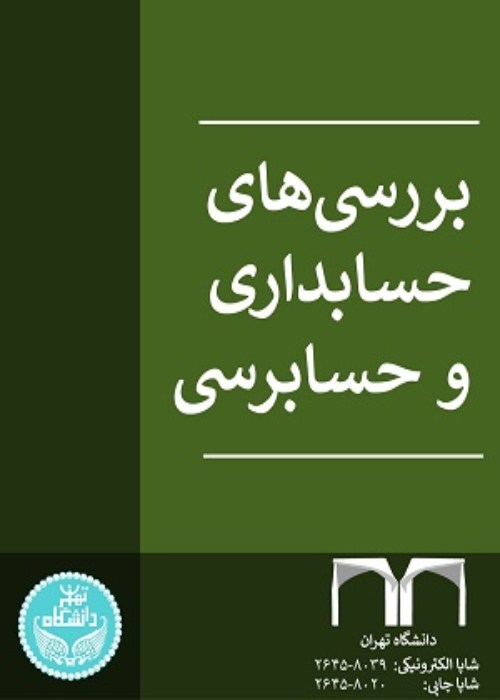Influence of Audit Manager's Leadership Style on Internal Audit Effectiveness
Article Type:
Research/Original Article (دارای رتبه معتبر)
Abstract:
Objective
The purpose of this study is to investigate the relationship between the leadership style (transformational, exchange-oriented, and free) of the internal audit manager and the effectiveness of the internal audit. It is expected that the transformational, exchange-oriented, and free leadership style increase the effectiveness of the internal audit unit i.e., the leadership styles can affect the individual, unit, and ultimately the organization's performance.Methods
This study employs a descriptive survey research approach, collecting data through a survey method. Internal auditors and internal audit managers working in companies listed on Tehran Stock Exchange in 2020 answered the research questionnaire. The structural equation method was used to analyze the findings and also Bass and Olion (1990) and Lenz et al. (2017) questionnaires were used to measure the independent and dependent variables of the research.Results
The hypothesis testing results indicated that transformational, exchange-oriented, and laissez-faire leadership styles positively impact internal audit effectiveness, leading to its enhancement. Therefore, "A transformational leadership style leverages the insights and ideas of the audit unit to achieve organizational goals, subsequently boosting employee motivation and morale. This, in turn, enhances employee effectiveness." When managers promote the sharing of information and experiences among internal audit employees, it results in an improvement in the knowledge, expertise, and overall performance of the internal audit unit. In addition, when managers delegate power and decision-making authority to employees, they foster independent opinions in implementing internal audit programs. This autonomy contributes to the heightened effectiveness of internal audits. Also, the free leadership style was found to have a greater impact on the effectiveness of internal audits than other styles i.e., transformational and free.Conclusion
According to the findings, the leadership style increases the effectiveness of internal audits. In other words, the internal audit manager makes the internal audit effective in performing its duties by managing the internal audit unit in a transformative, exchange-oriented, and free leadership style. involving lower-ranking employees in decision-making significantly increases the viability of the decisions compared to when their participation is absent. In addition, When decision-making and leadership incorporate employee participation, appreciating their knowledge, ideas, and insights, while entrusting them with responsibilities, it leads to a decrease in employee resistance to change, lower conflicts, enhanced decision quality, improved interpersonal relationships, heightened job satisfaction, and ultimately, increased organizational productivity.Keywords:
Language:
Persian
Published:
The Iranian Accounting and Auditing Review, Volume:30 Issue: 112, 2023
Pages:
291 to 313
https://magiran.com/p2625356
دانلود و مطالعه متن این مقاله با یکی از روشهای زیر امکان پذیر است:
اشتراک شخصی
با عضویت و پرداخت آنلاین حق اشتراک یکساله به مبلغ 1,390,000ريال میتوانید 70 عنوان مطلب دانلود کنید!
اشتراک سازمانی
به کتابخانه دانشگاه یا محل کار خود پیشنهاد کنید تا اشتراک سازمانی این پایگاه را برای دسترسی نامحدود همه کاربران به متن مطالب تهیه نمایند!
توجه!
- حق عضویت دریافتی صرف حمایت از نشریات عضو و نگهداری، تکمیل و توسعه مگیران میشود.
- پرداخت حق اشتراک و دانلود مقالات اجازه بازنشر آن در سایر رسانههای چاپی و دیجیتال را به کاربر نمیدهد.
In order to view content subscription is required
Personal subscription
Subscribe magiran.com for 70 € euros via PayPal and download 70 articles during a year.
Organization subscription
Please contact us to subscribe your university or library for unlimited access!



